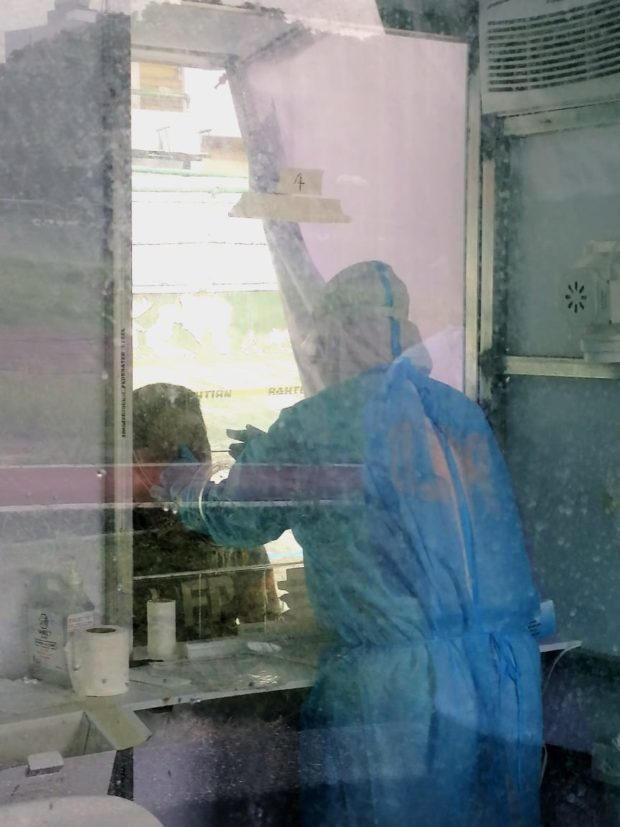Philippines looking at possible use of saliva-based COVID-19 testing
MANILA, Philippines — Local experts are studying the possible use of saliva-based COVID-19 testing in the Philippines after the United States reportedly authorized the use of the new and inexpensive coronavirus testing method.
According to Health Undersecretary Maria Rosario Vergeire, the Department of Health’s (DOH) laboratory experts panel has been looking into the saliva-based testing for nearly a month now.
“Pinag-aaralan ‘yan ng lab experts panel natin. I think we got that information matagal na, siguro mga three weeks or one month ago already,” Vergeire told reporters in an online press briefing Wednesday.

A health worker takes a swab sample from a man at the Swabbing Facility of the Quezon City government in Amoranto Stadium on Tuesday, August 18, 2020. Photo by Katherine G. Adraneda
“Ito naman ay binigay natin sa ating mga laboratory experts panel para pag-aralan at tignan yung iba’t-ibang experiences ng ibang countries using this method. Kapag nagkaroon na tayo ng information we will provide everybody,” she added.
The health official, however, explained that saliva-based testing is not a completely new method of screening for COVID-19 but only a different method of collecting samples.
“Itong saliva pinag-aralan as a sample na pwede or a specimen that we can use. Tinitignan ng ating lab expert panel kasi mas magiging madali kapag ka laway lang ang gagamitin,” Vergeire said.
“Pero maraming mga pinakita ang ating lab experts panel na medyo mas tedious siya kasi minsan laway may ibang mga particles ng pagkain so marami tayong pinag-aaralan ukol diyan,” she added.
US authorities recently announced the approval for authorized emergency use of the saliva test for COVID-19.
The new test, called SalivaDirect and was developed by researchers at the Yale School of Public Health, allows saliva samples to be collected in any sterile container.
It is reportedly a much less invasive process than the nasal swabs currently used to screen for SARS-CoV-2, the coronavirus that causes COVID-19.
In the Philippines, approved COVID-19 testing methods are the real-time reverse transcription-polymerase chain reaction or RT–PCR tests, which the DOH branded as the “gold standard” for coronavirus detection, the GeneXpert tests, Rapid Antibody rests and the Anti-Gen tests.
DOH is also studying the viability of pooled testing to further increase the country’s testing capacity.
Under the method, swab samples of multiple individuals will be put into a single RT-PCR test. If a positive result came back, further individual assessments will be made to ascertain which specimen is infected with the coronavirus. Meanwhile, if the swab tests come back negative, then individual testing will no longer be needed.
However, DOH said pooled testing will only be effective if used in areas where there is low-prevalence of COVID-19.
READ: DOH: Pooled testing only efficient in low-prevalence areas
As of Tuesday, there are 169,213 total COVID-19 cases nationwide, including 112,861 recoveries and 2,687 deaths.
The cases were detected through over 2 million coronavirus tests nationwide.
KGA
For more news about the novel coronavirus click here.
What you need to know about Coronavirus.
For more information on COVID-19, call the DOH Hotline: (02) 86517800 local 1149/1150.
The Inquirer Foundation supports our healthcare frontliners and is still accepting cash donations to be deposited at Banco de Oro (BDO) current account #007960018860 or donate through PayMaya using this link.